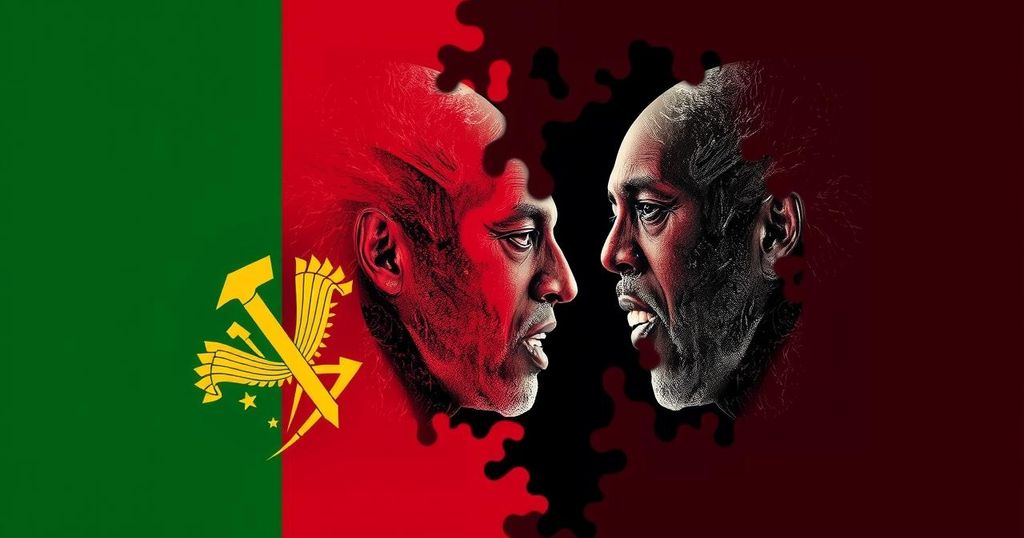The Angolan government has raised alarms about renewed violence in eastern DRC, marking a setback in recent peace efforts aimed at establishing a prolonged ceasefire. Clashes involving the Wazalendo self-defense group and M23 rebels have heightened tensions, while Angola continues to mediate between the DRC and Rwanda, both accused of fostering insurgent groups. Despite progress during a month-long ceasefire, humanitarian concerns remain critical as millions face displacement due to ongoing conflict.
The Angolan government has expressed serious concerns regarding the recent resurgence of violence in eastern Democratic Republic of Congo (DRC). This uptick in hostilities coincides with Angola’s efforts to negotiate a long-term ceasefire after a month-long period of relative calm. In a statement issued on Tuesday, the Angolan government condemned this new wave of violence as a “flagrant violation” of earlier agreements and the ceasefire established on August 4. Angola has been acting as a mediator between the DRC and Rwanda, both of whom have accused each other of harboring insurgents that threaten regional stability. The last diplomatic meeting held in Luanda two weeks prior resulted in a mutual commitment to pursue peaceful dialogue. Kinshasa has assured Rwanda it would not support the FDLR rebels, viewed as adversaries by Kigali, contingent upon Rwanda ceasing its support for the M23 rebels. Angola categorically repudiated the recent violent incidents, emphasizing their detrimental impact on the ongoing peace efforts. The fighting, which occurred over the weekend near Kalembe, involved clashes between the Wazalendo self-defense group and M23 rebels, leading to the Congolese army regaining control of the area. Local leaders, such as former MP Juvenal Munubo, disclosed that the NDC Rénové armed group had attained control of Kalembe with FDRC’s support, asserting the importance of consolidating this military success. MP Willy Mishiki has highlighted rebel ambitions to extend their control to additional provinces, raising alarms about further destabilization of the region. In a separate commentary, Munubo criticized the lack of response from Kinshasa regarding the ceasefire violations and questioned the efficacy of the agreements reached in Luanda. Despite the troubling return of violence, the August ceasefire had initially shown promise, allowing some displaced persons to consider returning home, departing from overcrowded and precarious living conditions. Nonetheless, the DRC government remains firm against engaging in dialogue with the M23, though discussions with Rwanda are ongoing. Following a meeting of the foreign ministers of the two nations on October 12, both parties reiterated their commitment to resolving security challenges arising from the proposed peace agreement. Angola has emphasized the necessity for caution to prevent further escalation of conflict, stressing the urgency of addressing the dire humanitarian crisis afflicting eastern DRC. Furthermore, Kinshasa and Kigali have agreed to form a verification mechanism aimed at overseeing the peace initiatives, with plans for its official launch in Goma by November 5, 2024. In the recent clashes, at least 14 civilians sustained injuries, prompting many to flee their homes. The United Nations High Commissioner for Human Rights has projected that 940,000 individuals will be displaced in the year 2024, elevating the total figure of displaced persons in the DRC to nearly seven million. The ongoing conflict has severely impacted civilians, particularly in North Kivu, who face extreme overcrowding and alarming levels of human rights violations, including sexual violence.
The Democratic Republic of Congo has been embroiled in conflict for decades, leading to instability and humanitarian crises that often spill over into neighboring countries. The eastern regions, particularly North Kivu and South Kivu, have been plagued by violence from multiple armed groups, compounded by issues of regional rivalry and international involvement. Angola has taken a mediating role, seeking to foster dialogue between the DRC and Rwanda, both of which accuse each other of supporting insurgent groups that threaten their security. The situation remains complicated with various factions vying for power, and humanitarian conditions continue to deteriorate, necessitating urgent international attention and intervention.
The resurgence of violence in eastern DRC has prompted the Angolan government to voice serious concerns, casting doubt on recent peace efforts following an established ceasefire. As mediators, Angola remains committed to facilitating dialogue between the DRC and Rwanda, yet the situation continues to evolve with clashes reported and civilian displacement escalating. The announcement of a monitoring mechanism offers a glimmer of hope, yet the ongoing humanitarian crisis and the ambitions of various armed groups in the region underscore the fragility of peace in the DRC.
Original Source: www.theeastafrican.co.ke






